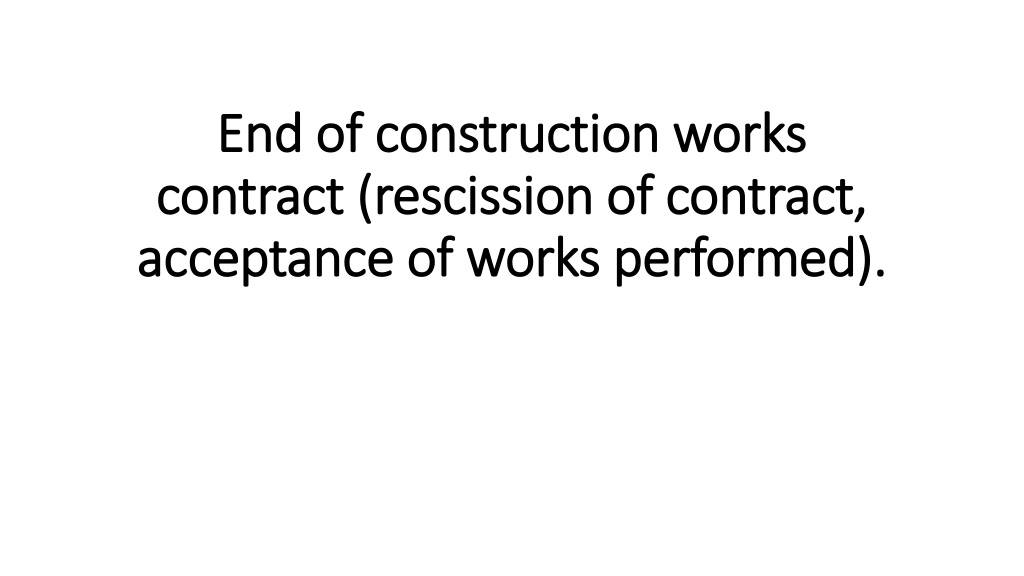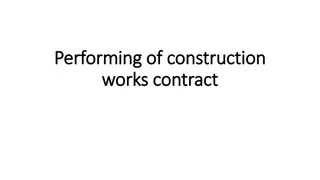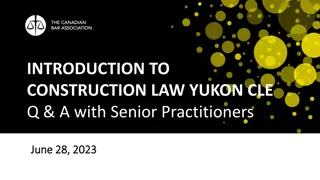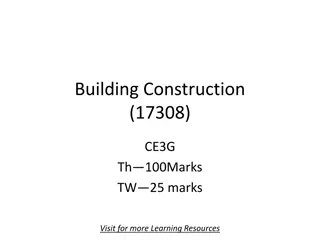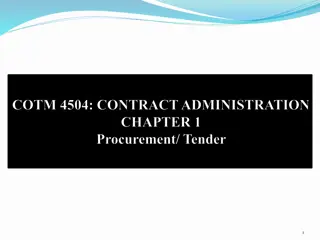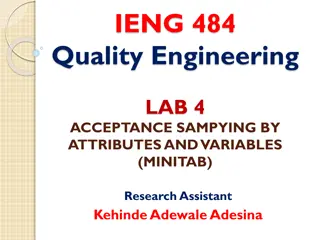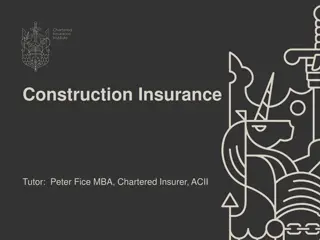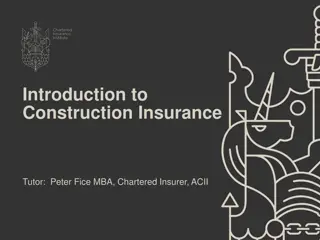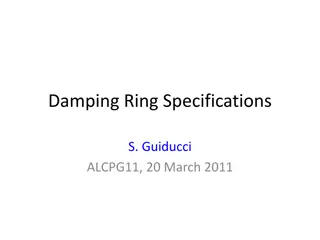Understanding Acceptance of Construction Works
The process of acceptance of construction works involves rescission of contracts, different types of acceptance such as partial, final, and definitive, and the obligations of investors and contractors. It also includes details on partial acceptance according to Art. 654 CC and FIDIC regulations for Taking-Over Certificates. The content explains the rights and responsibilities of the parties involved in accepting completed works, along with related legal aspects.
Download Presentation

Please find below an Image/Link to download the presentation.
The content on the website is provided AS IS for your information and personal use only. It may not be sold, licensed, or shared on other websites without obtaining consent from the author. Download presentation by click this link. If you encounter any issues during the download, it is possible that the publisher has removed the file from their server.
E N D
Presentation Transcript
End of construction works End of construction works contract (rescission of contract, contract (rescission of contract, acceptance of works performed). acceptance of works performed).
ACCEPTANCE ACCEPTANCE OF CONSTRUCTION WORKS CONSTRUCTION WORKS OF
End of construction works contract (rescission End of construction works contract (rescission of contract, acceptance of works performed). of contract, acceptance of works performed). Types of cceptance of construction works Partial acceptance Final acceptance Definitive acceptance Types of acceptance of construction works with reservations without reservations
PARTIAL ACCEPTANCE PARTIAL ACCEPTANCE Art. 654 CC Partial acceptance. In the absence of a provision in the contract to the contrary, the investor is obliged to accept, at the contractor's demand, works performed partially, as completed, against payment of an appropriate part of the remuneration. Art. 450 CC Partial performance. A creditor cannot refuse to accept a partial performance even if his whole claim is already due and payable unless accepting the partial performance violates his justified interest. Art. 457 CC Stipulation of time to the debtor's benefit. The time for a performance specified by a legal act is deemed, in case of doubt, as stipulated to the benefit of the debtor.
PARTIAL ACCEPTANCE PARTIAL ACCEPTANCE 10.1 FIDIC The Contractor may apply for a Taking-Over Certificate by giving a Notice to the Engineer not more than 14 days before the Works will, in the Contractor s opinion, be complete and ready for taking over. If the Works are divided into Sections, the Contractor may similarly apply for a Taking-Over Certificate for each Section.
PARTIAL ACCEPTANCE PARTIAL ACCEPTANCE 10.2 FIDIC The Engineer may, at the sole discretion of the Employer, issue a Taking-Over Certificate for any part of the Permanent Works. The Employer shall not use any part of the Works (other than as a temporary measure, which is either stated in the Specification or with the prior agreement of the Contractor) unless and until the Engineer has issued a Taking-Over Certificate for this part. However, if the Employer does use any part of the Works before the Taking-Over Certificate is issued the Contractor shall give a Notice to the Engineer identifying such part and describing such use, and: that Part shall be deemed to have been taken over by the Employer as from the date on which it is used; (b) the Contractor shall cease to be liable for the care of such Part as from this date, when responsibility shall pass to the Employer; and (c) the Engineer shall immediately issue a Taking-Over Certificate for this Part, and any outstanding work to be completed (including Tests on Completion) and/or defects to be remedied shall be listed in this certificate. If the Contractor incurs Cost as a result of the Employer taking over and/ or using a Part, the Contractor shall be entitled subject to Sub-Clause 20.2 [Claims For Payment and/or EOT] to payment of such Cost Plus Profit.
FINAL ACCEPTANCE FINAL ACCEPTANCE Art. 647 CC By a construction works contract, the contractor commits to hand over the facility provided for in the contract performed in accordance with the design and technical know-how, and the investor commits to carry out the actions required by the relevant regulations to prepare the works, especially to hand over the construction site and to deliver the design and to accept the facility and pay the agreed remuneration.
FINAL ACCEPTANCE FINAL ACCEPTANCE 10.1 FIDIC The Works shall be taken over by the Employer when, inter alia: - a Taking-Over Certificate for the Works has been issued, or is deemed to have been issued in accordance with this Sub-Clause. The Contractor may apply for a Taking-Over Certificate by giving a Notice to the Engineer not more than 14 days before the Works will, in the Contractor s opinion, be complete and ready for taking over.
FINAL ACCEPTANCE FINAL ACCEPTANCE 10.1 FIDIC The Engineer shall, within 28 days after receiving the Contractor s Notice, either: issue the Taking-Over Certificate to the Contractor, stating the date on which the Works or Section were completed in accordance with the Contract, except for any minor outstanding work and defects (as listed in the Taking-Over Certificate) which will not substantially affect the safe use of the Works or Section for their intended purpose (either until or whilst this work is completed and these defects are remedied); or reject the application by giving a Notice to the Contractor, with reasons. This Notice shall specify the work required to be done, the defects required to be remedied and/or the documents required to be submitted by the Contractor to enable the Taking-Over Certificate to be issued. The Contractor shall then complete this work, remedy such defects and/or submit such documents before giving a further Notice under this Sub-Clause
FINAL ACCEPTANCE FINAL ACCEPTANCE 10.1 FIDIC If the Engineer does not issue the Taking-Over Certificate or reject the Contractor s application within this period of 28 days, and if the conditions described in sub-paragraphs (a) to (d) above (where applicable) have been fulfilled, the Works or Section shall be deemed to have been completed in accordance with the Contract on the fourteenth day after the Engineer receives the Contractor s Notice of application and the Taking-Over Certificate shall be deemed to have been issued.
FINAL ACCEPTANCE FINAL ACCEPTANCE INVESTOR S DEFAULT Art. 486 CC 1. If the creditor is in default, the debtor may demand that any resulting damage be remedied; he may also place the object of the performance in court deposit. 2. A creditor is in default if, without good cause, he either avoids accepting a performance offered or refuses to perform an act without which the performance cannot be made, or represents to the debtor that he will not accept the performance.
GENERAL ISSUES OF RESCISSION GENERAL ISSUES OF RESCISSION THE CONTRACT OF THE CONTRACT OF CONSTRUCTION WORKS CONSTRUCTION WORKS
GENERAL ISSUES OF RESCISSION THE GENERAL ISSUES OF RESCISSION THE CONTRACT OF CONSTRUCTION WORKS CONTRACT OF CONSTRUCTION WORKS Art. 656 CC 1. The provisions on specific work contracts apply accordingly to the effects of any delay by the contractor in starting the works or completing the facility or performance of the works by the contractor in a defective way or contrary to the contract, to implied warranty for defects in the constructed facility, and to the investor's rights to rescind the contract before the facility is completed. Art. 657 CC The right of the contractor or the investor to rescind the contract may be limited or excluded by specific regulations.
GENERAL ISSUES OF RESCISSION THE GENERAL ISSUES OF RESCISSION THE CONTRACT OF CONSTRUCTION WORKS CONTRACT OF CONSTRUCTION WORKS RESCISSION AT THE WILL OF THE INVESTOR Art. 644 CC Rescission. Until the specific work is completed, the orderer may at any time rescind the contract by paying the agreed remuneration. In this case, however, the orderer may deduct all that the person that accepted the order has saved by not performing the specific work.
GENERAL ISSUES OF RESCISSION THE GENERAL ISSUES OF RESCISSION THE CONTRACT OF CONSTRUCTION WORKS CONTRACT OF CONSTRUCTION WORKS RESCISSION AT THE WILL OF THE INVESTOR 15.5 FIDIC Termination for Employer s Convenience The Employer shall be entitled to terminate the Contract at any time for the Employer s convenience, by giving a Notice of such termination to the Contractor (which Notice shall state that it is given under this Sub-Clause 15.5). After giving a Notice to terminate under this Sub-Clause, the Employer shall immediately: (a) have no right to further use any of the Contractor s Documents, which shall be returned to the Contractor, except those for which the Contractor has received payment or for which payment is due under a Payment Certificate; (b) if Sub-Clause 4.6 [Co-operation] applies, have no right to allow the continued use (if any) of any Contractor s Equipment, Temporary Works, access arrangements and/or other of the Contractor s facilities or services; and (c) make arrangements to return the Performance Security to the Contractor.
GENERAL ISSUES OF RESCISSION THE GENERAL ISSUES OF RESCISSION THE CONTRACT OF CONSTRUCTION WORKS CONTRACT OF CONSTRUCTION WORKS RESCISSION AT THE WILL OF THE INVESTOR 15.5 FIDIC Termination under this Sub-Clause shall take effect 28 days after the later of the dates on which the Contractor receives this Notice or the Employer returns the Performance Security. Unless and until the Contractor has received payment of the amount due under Sub-Clause 15.6 [Valuation after Termination for Employer s Convenience], the Employer shall not execute (any part of) the Works or arrange for (any part of) the Works to be executed by any other entities. After this termination, the Contractor shall proceed in accordance with Sub-Clause 16.3 [Contractor s Obligations After Termination].
GENERAL ISSUES OF RESCISSION THE GENERAL ISSUES OF RESCISSION THE CONTRACT OF CONSTRUCTION WORKS CONTRACT OF CONSTRUCTION WORKS CONTRACTURAL RESCISSION RIGHT Art. 395 CC 1. It may be stipulated that one or both parties will have the right to rescind the contract during a specified period. This right is exercised by a declaration being made to the other party. 2. If the right to rescind is exercised, a contract is deemed not to have been executed. Whatever the parties have already provided is returned unchanged unless the change was necessary as part of ordinary management. The other party is entitled to appropriate remuneration for the services provided and for using a thing.
GENERAL ISSUES OF RESCISSION THE GENERAL ISSUES OF RESCISSION THE CONTRACT OF CONSTRUCTION WORKS CONTRACT OF CONSTRUCTION WORKS CONTRACTURAL RESCISSION RIGHT Art. 492 CC LEX COMMISORIA If the right to rescind a reciprocal contract is stipulated for non- performance of an obligation within a strictly specified period, the entitled party may, if the other party defaults, rescind the contract without setting an additional period. The same applies where performance of an obligation by one of the parties after the period set would be meaningless to the other party due to the nature of the obligation or due to the purpose of the contract intended by it and known to the defaulting party.
GENERAL ISSUES OF RESCISSION THE GENERAL ISSUES OF RESCISSION THE CONTRACT OF CONSTRUCTION WORKS CONTRACT OF CONSTRUCTION WORKS CONTRACTURAL RESCISSION RIGHT Art. 396 CC COMPENSATION FOR LOSS OF CONTRACT If it is stipulated that one or both parties may rescind the contract upon payment of a specified sum (compensation for loss of contract), the declaration on rescission is effective only if it is submitted at the same time as payment of the compensation for loss of contract.
GENERAL ISSUES OF RESCISSION THE GENERAL ISSUES OF RESCISSION THE CONTRACT OF CONSTRUCTION WORKS CONTRACT OF CONSTRUCTION WORKS RESCINESSION DUE TO DELAY Art. 491 CC Default. 1. If one of the parties defaults in performance of an obligation under a reciprocal contract, the other party may set an additional period for its performance with the sanction that if the specified period passes to no effect, it will be entitled to rescind the contract. It may also, either without setting an additional period or after the set period passes to no effect, demand that the obligation be performed and that any damage resulting from the default be remedied. 2. If the performances of the two parties are divisible, and one of the parties defaults only in part of the performance, the right to rescind the contract vested in the other party is limited, at its discretion, either to that part, or to the whole remaining part of the performance not made. That party may also rescind the entire contract if partial performance were meaningless to it due to the nature of the obligation or due to the purpose of the contract intended by that party and known to the defaulting party.
GENERAL ISSUES OF RESCISSION THE GENERAL ISSUES OF RESCISSION THE CONTRACT OF CONSTRUCTION WORKS CONTRACT OF CONSTRUCTION WORKS RESCINESSION DUE TO DELAY Art. 476 CC Debtor's delay; default. A debtor is in default if he does not make the performance on time and, if the time limit is not specified, if he does not make the performance immediately at the creditor's demand. This does not apply where the delay in making the performance is due to circumstances for which the debtor is not liable.
GENERAL ISSUES OF RESCISSION THE GENERAL ISSUES OF RESCISSION THE CONTRACT OF CONSTRUCTION WORKS CONTRACT OF CONSTRUCTION WORKS RESCESSION DUE TO DEFECTIVE PERFORMANCE Art. 636 CC 1. If the person that accepted the order performs the specific work in a defective manner or contrary to the contract, the orderer may call on him to change the manner of performance and may set an appropriate period for this purpose. After the period so set passes to no effect, the orderer may rescind the contract or entrust the correction or further performance of the specific work to another person at the cost and risk of the person that accepted the order. 2. If the orderer supplies the material himself, he may, in the event the contract is rescinded or the specific work is entrusted to another person, demand that the material be returned and that the started work be handed over.
GENERAL ISSUES OF RESCISSION THE GENERAL ISSUES OF RESCISSION THE CONTRACT OF CONSTRUCTION WORKS CONTRACT OF CONSTRUCTION WORKS RESCESSION DUE TO INVESTOR S DEFECTS 16.2.1 FIDIC Notice The Contractor shall be entitled to give a Notice (which shall state that it is given under this Sub-Clause 16.2.1) to the Employer of the Contractor s intention to terminate the Contract or, in the case of sub-paragraph (g)(ii), (h), (i) or (j) below a Notice of termination, if: (a) the Contractor does not receive the reasonable evidence within 42 days after giving a Notice under Sub-Clause 16.1 [Suspension by Contractor] in respect of a failure to comply with Sub-Clause 2.4 [Employer s Financial Arrangements]; (b) the Engineer fails, within 56 days after receiving a Statement and supporting documents, to issue the relevant Payment Certificate; (c) the Contractor does not receive the amount due under any Payment Certificate within 42 days after the expiry of the time stated in Sub-Clause 14.7 [Payment]; and such failure constitutes a material breach of the Employer s obligations under the Contract;
GENERAL ISSUES OF RESCISSION THE GENERAL ISSUES OF RESCISSION THE CONTRACT OF CONSTRUCTION WORKS CONTRACT OF CONSTRUCTION WORKS 16.2.1 FIDIC (e) the Employer substantially fails to perform, and such failure constitutes a material breach of, the Employer s obligations under the Contract; (f) the Contractor does not receive a Notice of the Commencement Date under Sub-Clause 8.1 [Commencement of Works] within 84 days after receiving the Letter of Acceptance; ( ) (h) a prolonged suspension affects the whole of the Works as described in sub-paragraph (b) of Sub-Clause 8.12 [Prolonged Suspension]; (i) the Employer becomes bankrupt or insolvent; goes into liquidation, administration, reorganisation, winding-up or dissolution; becomes subject to the appointment of a liquidator, receiver, administrator, manager or trustee; enters into a composition or arrangement with the Employer s creditors; or any act is done or any event occurs which is analogous to or has a similar effect to any of these acts or events under applicable Laws; or (j) the Employer is found, based on reasonable evidence, to have engaged in corrupt, fraudulent, collusive or coercive practice at any time in relation to the Works or to the Contract.
GENERAL ISSUES OF RESCISSION THE GENERAL ISSUES OF RESCISSION THE CONTRACT OF CONSTRUCTION WORKS CONTRACT OF CONSTRUCTION WORKS RESCISSION DUE TO CONTRACTOR S DEFECTS Art. 637 CC Implied warranty for defects. 1. If a specific work has defects, the orderer may demand that they be removed by giving the person that accepted the order an additional period for this purpose with the stipulation that, after the period passes to no effect, he will not accept the rectification. The person that accepted the order may refuse to rectify the specific work if it entails excessive costs. 2. If the defects cannot be removed or if it follows from the circumstances that the person that accepted the order will not be able to remove them on time, the orderer may rescind the contract if the defects are major; if the defects are minor, the orderer may demand an appropriate reduction in the remuneration. The same applies where the person that accepted the order does not remove the defects during a period set by the orderer.
GENERAL ISSUES OF RESCISSION THE GENERAL ISSUES OF RESCISSION THE CONTRACT OF CONSTRUCTION WORKS CONTRACT OF CONSTRUCTION WORKS RESCINATION BY INVERSTOR 15.1 FIDIC Notice to Correct If the Contractor fails to carry out any obligation under the Contract the Engineer may, by giving a Notice to the Contractor, require the Contractor to make good the failure and to remedy it within a specified time ( Notice to Correct in these Conditions). ( ) After receiving a Notice to Correct the Contractor shall immediately respond by giving a Notice to the Engineer describing the measures the Contractor will take to remedy the failure, and stating the date on which such measures will be commenced in order to comply with the time specified in the Notice to Correct. The time specified in the Notice to Correct shall not imply any extension of the Time for Completion.
GENERAL ISSUES OF RESCISSION THE GENERAL ISSUES OF RESCISSION THE CONTRACT OF CONSTRUCTION WORKS CONTRACT OF CONSTRUCTION WORKS RESCINATION BY INVERSTOR 15.2.1 FIDIC The Employer shall be entitled to give a Notice (which shall state that it is given under this Sub-Clause 15.2.1) to the Contractor of the Employer s intention to terminate the Contract or, in the case of sub-paragraph (f), (g) or (h) below a Notice of termination, if the Contractor: (a) fails to comply with: (i) a Notice to Correct; (ii) a binding agreement, or final and binding determination, under Sub- Clause 3.7 [Agreement or Determination]; or and such failure constitutes a material breach of the Contractor s obligations under the Contract;
GENERAL ISSUES OF RESCISSION THE GENERAL ISSUES OF RESCISSION THE CONTRACT OF CONSTRUCTION WORKS CONTRACT OF CONSTRUCTION WORKS RESCINATION BY INVERSTOR 15.2.1 FIDIC (b) abandons the Works or otherwise plainly demonstrates an intention not to continue performance of the Contractor s obligations under the Contract; (c) without reasonable excuse fails to proceed with the Works in accordance with Clause 8 [Commencement, Delays and Suspension] or, if there is a maximum amount of Delay Damages stated in the Contract Data, his failure to comply with Sub-Clause 8.2 [Time for Completion] is such that the Employer would be entitled to Delay Damages that exceed this maximum amount; (d) without reasonable excuse fails to comply with a Notice of rejection given by the Engineer under Sub- Clause 7.5 [Defects and Rejection] or an Engineer s instruction under Sub-Clause 7.6 [Remedial Work], within 28 days after receiving it; (e) fails to comply with Sub-Clause 4.2 [Performance Security]; (f) subcontracts the whole, or any part of, the Works in breach of Sub-Clause 5.1 [Subcontractors], or assigns the Contract without the required agreement under Sub-Clause 1.7 [Assignment]; (g) becomes bankrupt or insolvent; goes into liquidation, administration, reorganisation, winding-up or dissolution; becomes subject to the appointment of a liquidator, receiver, administrator, manager or trustee; enters into a composition or arrangement with the Contractor s creditors; or any act is done or any event occurs which is analogous to or has a similar effect to any of these acts or events under applicable Laws;
GENERAL ISSUES OF RESCISSION THE GENERAL ISSUES OF RESCISSION THE CONTRACT OF CONSTRUCTION WORKS CONTRACT OF CONSTRUCTION WORKS OBLIGATIONS OF THE RESCINDING PARTY Art. 494 CC The party rescinding a reciprocal contract is obliged to return to the other party all that it received from the latter under the contract; it may demand that not only all that it provided be returned but also that any damage.
GENERAL ISSUES OF RESCISSION THE GENERAL ISSUES OF RESCISSION THE CONTRACT OF CONSTRUCTION WORKS CONTRACT OF CONSTRUCTION WORKS RETENTION RIGHT Art. 496 CC Retention right. If, as a result of the contract being rescinded, the parties are to return reciprocal performances, each of them has a retention right until the other party offers return of the performance received or secures the claim for return.
GENERAL ISSUES OF RESCISSION THE GENERAL ISSUES OF RESCISSION THE CONTRACT OF CONSTRUCTION WORKS CONTRACT OF CONSTRUCTION WORKS UNJUST ENRICHMENT Art. 410 CC 1. The provisions of the proceeding articles apply especially to an undue performance. 2. A performance is undue if the person who makes it is not under any obligation or is not under any obligation towards the person to whom he makes the performance, or if the basis of the performance has ceased to exist or the intended purpose of the performance is not attained, or if the legal act binding him to make the performance is invalid and does not become valid after the performance is made. Art. 405 CC Anyone who without legal grounds has gained a financial benefit at the expense of another person is obliged to hand over the benefit in kind, and if this is not possible, to return its value. Art. 406 CC The obligation to hand over the benefit includes not only benefits gained directly, but also all that, in the case of transfer, loss or damage, was obtained in exchange for the benefit or as remedy of damage.
GENERAL ISSUES OF RESCISSION THE GENERAL ISSUES OF RESCISSION THE CONTRACT OF CONSTRUCTION WORKS CONTRACT OF CONSTRUCTION WORKS 15.2.3 FIDIC After termination After termination of the Contract under Sub-Clause 15.2.2 [Termination], the Contractor shall: (a) comply immediately with any reasonable instructions included in a Notice given by the Employer under this Sub-Clause: (i) for the assignment of any subcontract; and (ii) for the protection of life or property or for the safety of the Works; (b) deliver to the Engineer: (i) any Goods required by the Employer, (ii) all Contractor s Documents, and (iii) all other design documents made by or for the Contractor to the extent, if any, that the Contractor is responsible for the design of part of the Permanent Works under Sub-Clause 4.1 [Contractor s General Obligations]; and (c) leave the Site and, if the Contractor does not do so, the Employer shall have the right to expel the Contractor from the Site.
GENERAL ISSUES OF RESCISSION THE GENERAL ISSUES OF RESCISSION THE CONTRACT OF CONSTRUCTION WORKS CONTRACT OF CONSTRUCTION WORKS SUBSTITUTE PERFORMANCE 15.2.4 FIDIC Completion of the Works After termination under this Sub-Clause, the Employer may complete the Works and/or arrange for any other entities to do so. The Employer and/or these entities may then use any Goods and Contractor s Documents (and other design documents, if any) made by or on behalf of the Contractor to complete the Works.
